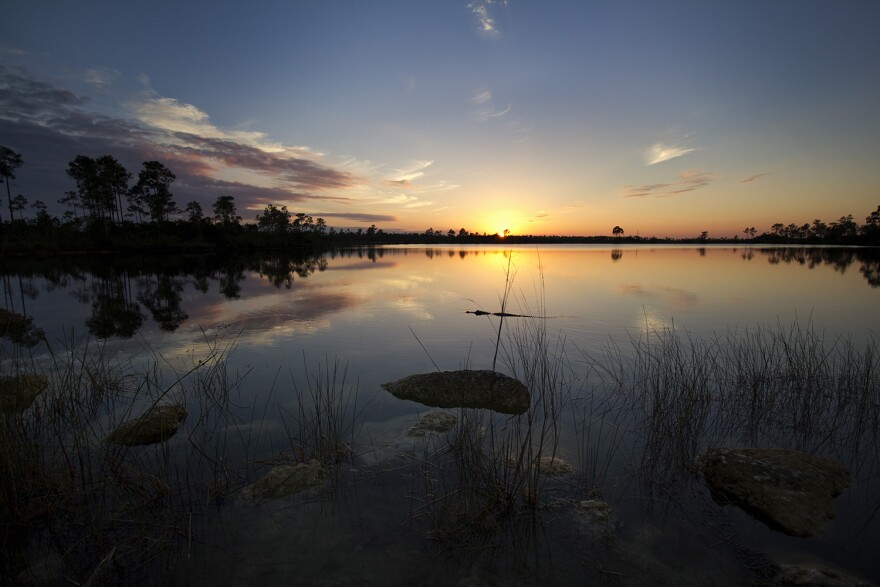When Rev. Houston Cypress was a little boy, his grandparents would wake him up just before school to take him out on airboat rides in the Everglades. They would move through the water, lulled by the early morning sounds of buzzing insects and squawking birds. Sometimes it felt like he was still dreaming as he watched the fog and the mist roll over the river of grass, and his grandparents would tell him the stories of the places they visited.
Cypress is a member of the Otter Clan of the Miccosukee Tribe of Indians of Florida and an advocate for the restoration of the Everglades. He wants to preserve his community’s cultural traditions for the next generation. He learned from his elders about traditional plant practices that involve activating specific plants through song and prayer, and these customs are dependent on native plant species like the bay tree. He said these practices heal illnesses in the body, the mind and the spirit.
“It’s really concerning how changes in the environment are impacting our spiritual and cultural practices,” he said. “Climate change and sea level rise, and the increasing frequency and intensity of storms.”
Excess nutrients degrade the water quality in the Everglades, said Cypress. Invasive species have been taking over, outcompeting native plants and wildlife. And many plant communities are migrating inland, away from coastal areas.
In 2018, Cypress founded a nonprofit called Love the Everglades Movement to bring attention to these issues. His work combines advocacy, arts, education and spirituality with the goal of inspiring action and bringing positive change to the land.
Cypress is not just an activist but a filmmaker as well, and his productions are love letters to the Everglades. In his short film entitled “…what endures..,” he reads his poetry, a musical combination of the Miccosukee and English languages.

Throughout his productions, Cypress has come to appreciate the teamwork required to create a film. He is a storyteller and a poet but his focus is never just on the piece that he is creating, it’s also on the relationships and the interactions that make it possible.
“I like how art can be a convening force,” he said. “Art that is collaborative, art that embraces multiple voices…I think art can inspire action, and that art can bring positive change to the land.”
Miccosukee histories and traditions are not written. Instead, they are passed down orally. This storytelling tradition is something that Cypress calls the living narrative — stories that are alive, and that have been carried for centuries, passed down through generations.
“So much of the things that I identify with as a Miccosukee man are the stories, and the traditions, the dances, the art forms that have been gifted to me from my ancestors,” he said.
Cypress is a storyteller himself and he uses his artform to build a community, something that is a theme in much of his work. He describes himself as an optimist. When it comes to issues like climate change, he considers the work that he does to be an opportunity to build relationships.
“When we have new friendships and new coalitions, we learn. Our sense of compassion grows. Our sense of responsibility is strengthened,” he said. “I think it’s a hopeful thing.”
This mindset expands into his other pursuits as well. Cypress identifies as a gay man and a Two Spirit person, meaning he is a person with both feminine and masculine spirit. He is an LGBTQ+ activist, and his work in this area shares common threads with his environmental advocacy and, above all else, his desire to uphold indigenous culture and tradition.
“I recently started a support group for Miccosukee and Seminole LGBTQ people so that they feel affirmed and they can go out and explore the world, but they also can feel welcome to come back home and bring all of their fullness and fabulousness around their campfires as well,” Cypress said. “So it’s about finding ways to stay rooted in our cultural and traditional practices, but also making space for their authenticity as well.”
His work revolves around the Everglades, but he emphasizes the importance of building a stronger community. He welcomes outsiders to come visit and experience the land themselves and practice deep listening.
“The word that we use to describe the Everglades is kahayatle. And that talks about the quality of the light reflecting off of the water at sunset,” Cypress said. “And so when you’re standing in the river of grass, the distinction between the sky and the earth is erased because everything scintillates, everything sparkles.”




